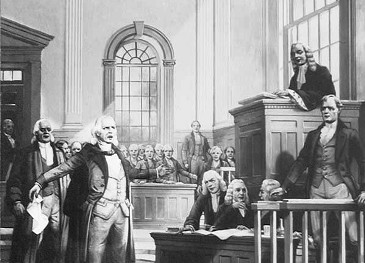 Congress shall make no law respecting an establishment of religion, or prohibiting the free exercise thereof; or abridging the freedom of speech, or of the press; or the right of the people peaceably to assemble, and to petition the Government for a redress of grievances.
Congress shall make no law respecting an establishment of religion, or prohibiting the free exercise thereof; or abridging the freedom of speech, or of the press; or the right of the people peaceably to assemble, and to petition the Government for a redress of grievances.
Early, in this country’s history, it was called the press. Now, it’s simply called, the media – due in large part because it not only encompasses print, but all manner of electronic “journalism” – network, cable, blog and now, Twitter.
However, fifty-five years before the Bill of Rights was written, printer and publisher John Peter Zenger of New York seems to have been the principal inspiration for the First of ten amendments to the United States Constitution.
Zenger’s New-York Weekly Journal was, like many newspapers of early colonial times, openly partisan, and the political figure Zenger attacked most frequently was New York’s British-appointed colonial governor William Cosby.
Incensed at Zenger’s constant tirades, Cosby issued a proclamation condemning the newspaper’s “divers scandalous, virulent, false and seditious reflections.” On Sunday, November 17, 1734 Zenger was arrested and charged with “seditious libel.”
Claiming the case to be unwinnable, no attorney wanted to take up the cause for the immigrant printer. Sitting in jail for more than eight months, Philadelphia attorney Hamilton stepped forward to defend Zenger, at no charge, whose case had now received wide public attention.
During the trial, Hamilton was at such odds with Chief Justice Delancey, a Cosby-appointed judge, that he altered his tactic. The young lawyer pleaded his client’s case directly to the jurors arguing that since the law was unjust, they should acquit Zenger despite Delancey’s instructions – a dicey strategy, at best.*
Fortunately for both Hamilton and Zenger, the jurors returned a verdict of “not guilty,” and the trial became the inspirational basis for the First Amendment to the U.S. Constitution.
*According to the American History version of the Intellectual Devotional, “The jurors depended on the controversial concept of ‘jury nullification,’ by which juries can choose not to enforce laws they consider unjust, to acquit Zenger. Although rarely used, American juries still have this prerogative.”
Comments










